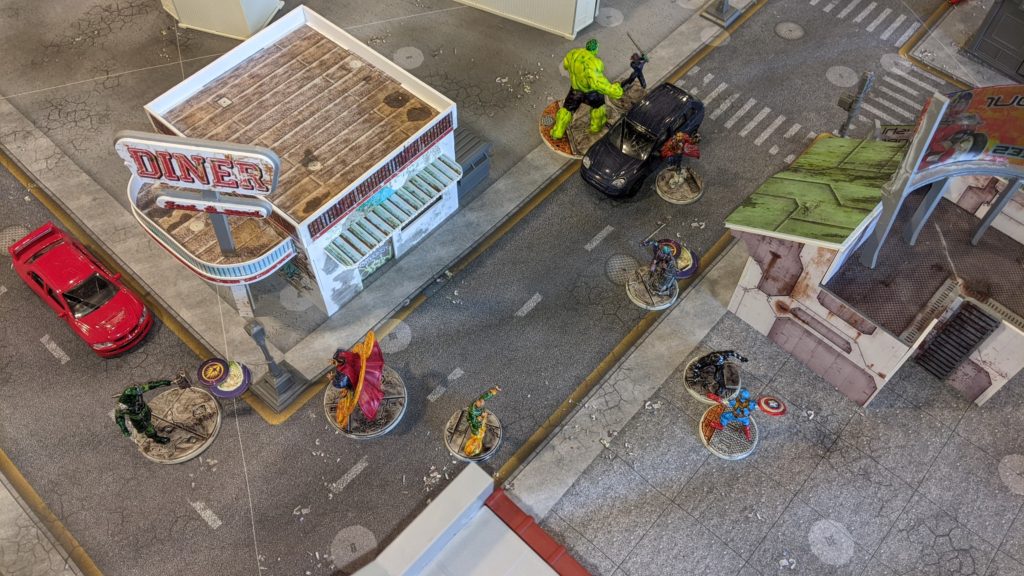With so much happening in the pre-game, we have more tips for showing up to your game prepared!
The last time we spoke about Marvel: Crisis Protocol, we took a high level view of the meaningful choices asked of players before the game even begins. This week we are getting a bit deeper into some of these, as each can be major factors in deciding the game before it starts.
First, a small caveat. If you just want to enjoy Crisis Protocol as the excellent game it is, but are not particularly concerned with top-tier play, that is entirely valid. More than many other games, the allure of favorite characters or teams is often enough that I will let that be the sole factor in my decision making. In cases like that some of this info applies, but much of it is aimed at getting every drop out of your competitively minded experience, instead.

More on Building A Roster:
Even if most of them will never see the table, your roster picks can be hugely influential on your game, and needs to be made with some key points in mind…
- Are you prepared to make a 5 model team for any game size? Crisis Protocol is a very low model count game, but one VERY much focused on playing the objectives. With few options for scoring VP through combat alone (Black Order, a Punisher and Killmonger card, etc…) you plan to win games by playing the scenario. At this scale, even a single model advantage or disadvantage is massive. A roster stacked with 4 or 5pt models can be looking at a virtual auto-loss if a 15VP scenario ends up happening. Expecting to go into every game with 5 models at an absolute minimum is generally a good plan.
- Try to have two affiliations available. Some affiliation abilities are universally good, while others are situational. Web-Warriors provide a valuable, table-wide defense die reroll that is always useful, but Defenders can be clutch at bypassing a pesky Vibranium Armor or Shield ability which melts to Mystic attacks. Having flexibility means a chance at avoiding some real frustration once you have seen your opponent’s roster. This can be tricky when combined with the prior point, but do look for characters that can fill multiple affiliations.
- Bring a 2pt character. Leaving points on the table can be really frustrating in this game that has stubbornly non-granular costs for models. Finding yourself giving up 10-15% of your points sucks, and bringing at least one 2pt character likely mitigates most of that possibility. It helps that characters like Wong and Nebula are surprisingly value-rich for their points.
Tactics Cards Can Win Games:
The Tactics cards you bring to a game can feel a bit overwhelming, as there are so many options, but played well, many can be game winners situationally, and others are just plain useful at all times.
Start by looking at the Tactics cards unique to an affiliation you can field. As these are restricted to actual members of an affiliation they are often incredibly strong as a balance to how widely used they can be. Card’s like “All Webbed Up” can create single turns that determine the outcome of a game, with pillow-fisted characters suddenly hitting like trucks, and Venom’s truck suddenly hitting like Galactus.

Character specific cards can likewise create a single moment on which a game shifts. Requiring finesse in positioning, Doctor Strange’s “Seven Suns of Cinnibus” can level an enemy team that was carelessly grouped together. These cards are often situational, but taking a couple in your pool of eight cards at least gives you the possibility.
Finally, it goes without saying that generic, unaffiliated cards like Patch-Up, or Medpack, should make up the bulk of your picks. A modest boon to every game will pay more competitive dividends over time than those big swings that only work once in a blue moon.
We will take a deeper look at Tactics cards in the weeks ahead, to be sure.
Parting Thought:
I referenced this last time, but Crisis Protocol is evolving into an absolutely amazing competitive game. We have layers of strategy still to consider, but one more tip as we part for the week…
In a game of alternating activations, the order you act in absolutely matters. KO’ing a model on one would remaining is less valuable if it has already activated that turn. Consider the possibility of going first next turn (in MCP you tend to know who will be activating last/first) and denying them an entire activation with that model.
Lots left to unpack here, but until next week, make mine Marvel Crisis Protocol.
And remember, Frontline Gaming sells gaming products at a discount, every day in their webcart!



